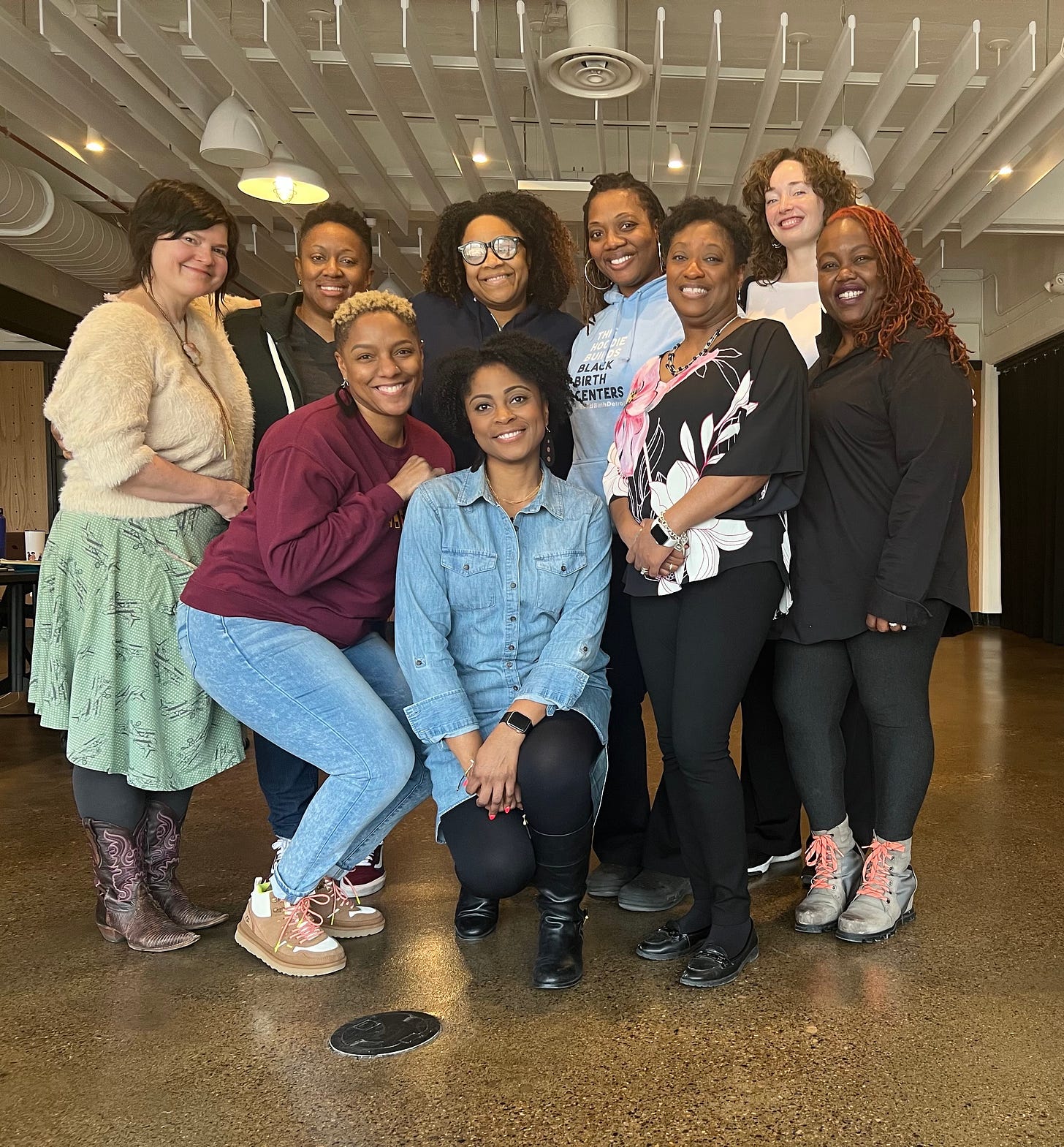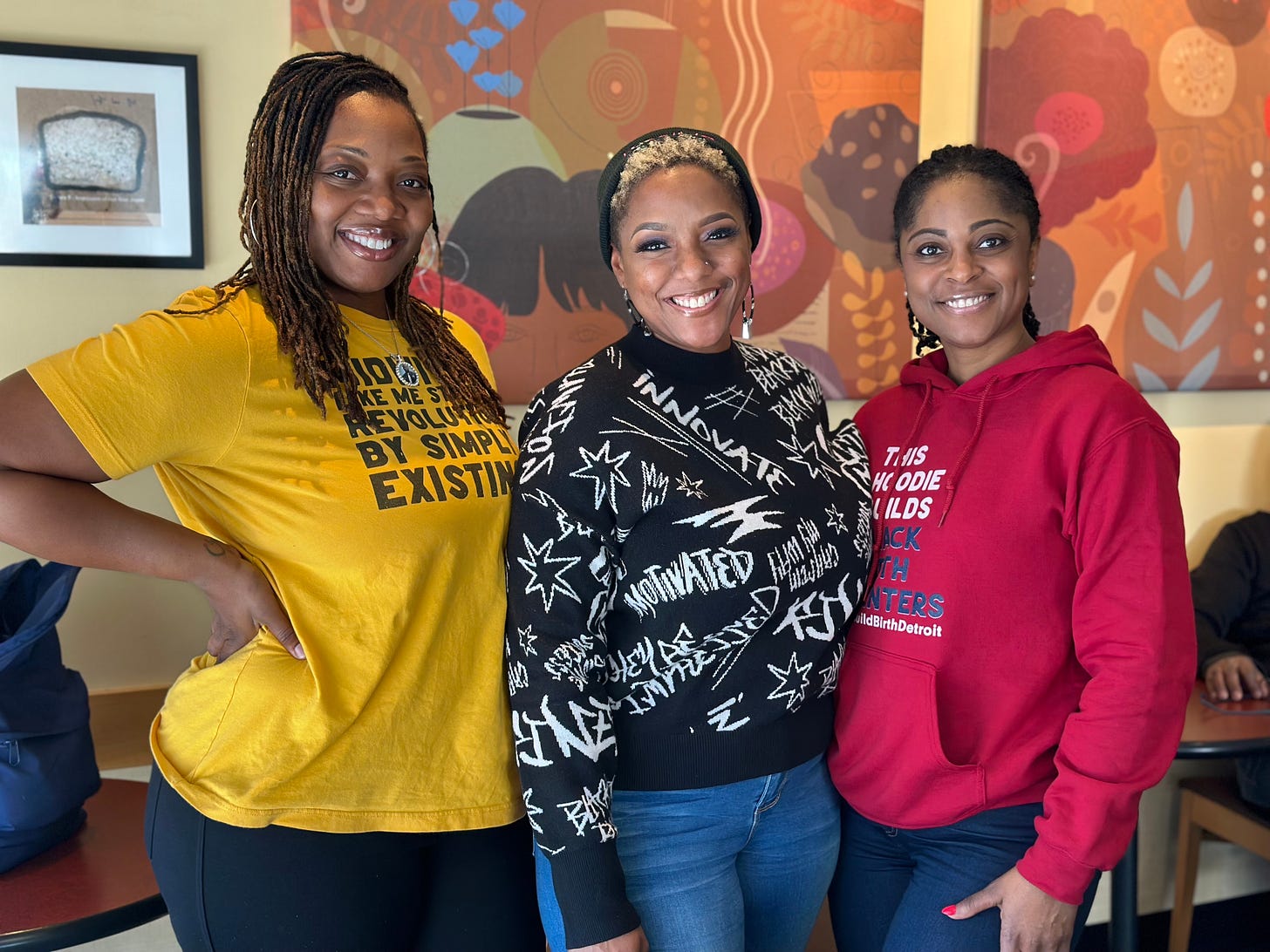When you look at our collective moment from some angles—through the headlines, as you drive by homeless encampments, via CO2 emissions—it can feel hellish. Which is why I find it so profoundly life-giving to sometimes meet and learn from people who are fully aware, sometimes even more aware, of the hellscape, and still insist on a verdant, just, joy-filled futurescape. The speculative fiction writers, the artists, the organizers, the builders.
Leseliey Welch is one such visionary. She offers her fertile imagination on how birthing in America could be different, especially for women of color. As she bends time backwards on itself, collectivizes, and dreams. Meet her and a more human future…

Courtney E. Martin: You argue that it’s critical that people understand the existence of a “Black maternal health crisis,” but “closing the gap”--on maternal or child deaths, or unnecessary C-sections, or any other variety of metrics--is not the goal. The goal is more visionary than that. Can you explain more?
Leseliey Welch: Yes, this is such an important question! It is critical to name and understand a really hard truth, and that is that the U.S. maternal health system is not working optimally well for anyone. We rank last among our economic peer countries on nearly all maternal health indicators – even when you isolate outcomes for White birthing people from those of people of color. And because of systemic racism, because we do not equally value Black, Brown, and Indigenous bodies in this country, our maternal health system is particularly harmful for Black, Brown and Indigenous birthing people.
The goal is not simply to not die or to reach parity with White birth outcomes. Survival should be the least of what we expect. The vision is safe, sacred, loving, celebratory birth for every birthing person. The goal is that every birthing person has access to midwifery care, proven to be the evidence-based best choice for low-risk pregnancies. The goal is that every birthing person has access to all safe birth options (hospital, birth center and home). At both Birth Detroit and Birth Center Equity, we are working toward a world where midwives, families and communities thrive.
Can you make us a little smarter about the racial redlining of midwifery? I think a lot of folks mistakenly think of it as a hippie White lady thing, as well as simply a matter of personal choice, rather than a political, economic, and human rights issue.
The fact that many folks think of midwifery as a White thing, and think that hospitals are the safest places to have babies is no accident, and has its roots in the systematic devaluation of Black midwifery. Most of our ancestors were born with midwives. For my great grandparents midwifery was not alternative or privileged birth care; Black midwives provided birth care and family care and were trained through apprenticeships.
There was a deliberate and racialized effort to change this, to shift birth care from the hands of Black midwives to White physicians and from homes to hospitals. This was done through legislation like the 1920’s Sheppard Towner Act (which established public health nurse supervision, training and oversight over traditional midwives), government backed campaigns defaming Black midwives as “dirty” and “uneducated,” and prominent academic journals featuring articles on “the midwife problem.” Hospital births were portrayed as more “modern” and more “advanced.” Moving into the 1930s and 40s, Black midwifery was increasingly marginalized and birth was less and less understood as a normal physiological life process.
The size of the midwifery workforce decreased substantially as birth became the purview of doctors and hospitals. When midwifery began to make a resurgence in this country, it reemerges in a context controlled by White medical institutions that require nursing education first and privilege nurse midwives over other licensed and certified professional midwives. So, the lack of access to midwifery education and midwifery care in Black communities is the result of decades of racialized policy and divestment that has never been redressed.
Transforming birth culture to embrace and value midwifery care and normal physiologic birth, will require economic, policy, and cultural narrative change. “If you want to hold a people in chains, you must first convince them that they need to be bound,” King Ghezo of the Dahomey says in the movie The Woman King.
I extrapolate this sentiment to birth choices in the U.S.: the maternal health system in the U.S. has undermined midwifery and convinced us that we all need to be medicated and in hospitals to safely have our babies. This is simply not true. The majority of births (upwards of 80% in fact) can safely take place with midwives in a community setting. We have to remember our history and question the sources of “authoritative” knowledge. We do not all need to give birth in hospitals; and midwives and birth centers should be real choices in all of our communities.
“You walk through the door, so happy to be able to receive care at a community birth center right in your neighborhood. You, your partner, and your children are greeted by name, maybe even with warm hugs. You are asked how you are doing and can tell that the person asking genuinely cares. They offer you water, tea, snacks, and you settle into a cozy sofa. Art by Black artists graces the walls. There are shelves of birth, nutrition, breastfeeding, and parenting books for you to borrow, and a toy nook in which your little ones can play.” Your dream for BIPOC+ led community birth centers is so vivid and compelling! What and/or who has equipped you to be so imaginative?
I love that the vision resonates and am so hopeful that more and more people will join us in work to realize it. It feels really important for me to name that I speak and write of a collective vision. Birth Detroit was co-founded by me and three amazing midwife and birth justice leaders Char’ly Snow, Nicole White and Elon Geffrard. I co-founded Birth Center Equity with Nashira Baril, the director of Neighborhood Birth Center in Boston. In each of our cities, we engaged families in our communities and asked about their needs, desires and visions for care. So the vision Nashira and I uplift in our Nonprofit Quarterly article “Birthing Black: Community Birth Centers as Portals to Gentle Futures” is one rooted in the visions of families and leaders across geographies.
It is also true that freedom dreaming is in our blood. Black activists have a long history of boundlessly visioning solutions and creating new possibilities
How did you get into this work in the first place?
Early in my college career, I actually aspired to be a physician. It wasn’t until I spent three months in a pediatric HIV research apprenticeship in Durban, South Africa that I began to change my mind. In the late 90s on the pediatric wards of the then King Edward Hospital (now named for Nelson Mandela), I really came to understand that health was about more than doctors and medicine. Knowing that people and babies were dying every day because of inequitable treatment access taught that health was also about business, money, politics, and who’s lives we value. The experience inspired me to learn about public health.
It was as a graduate student in public health that I fell in love with birth. I was a graduate student instructor for a Perspectives in Women’s Health course taught by a professor who was also a midwife. I learned about midwifery and doulas, and trained as a birth and postpartum doula. After I attended my first birth, I was hooked! I don’t know that there is a more sacred time to be present with and support families. In the 90s, I also volunteered in AIDS and cancer hospice. I have great reverence for the beginning and end of life, and believe that how we enter and exit this world matters.
I would later have my own children and personally experience the joy and grief of pregnancy and birth. My first baby Zoe Rose was born preterm. Years later, I had a late term loss and then my rainbow baby Savannah Jessie Grace.
My family also knows the heartbreak of infant death. A nephew of mine was born too soon, too small, and died the same day in a local Detroit hospital. I was working in maternal child health at the city health department at that time, and I would later read my nephew’s name—Jason Williams—on the list of infant losses that year. I would never see mortality and morbidity statistics the same. These statistics are not numbers to me. They represent me, my family, and my communities. The stories of subpar care, of not being heard, of having your concerns be dismissed are our stories.
I believe we deserve so much better than the care we are offered today, and as a public health professional I know midwifery care is evidence-based care. I know that community birth center care improves outcomes, enhances the birth experience, increases autonomy and respect, can be protective for Black birthing people – and is cost-effective. I want everyone to know this. I want our birth care in this country to reflect what is truly in the best interest of birthing people, babies and families.
What are your top three songs for a birthing power playlist?
This question makes me laugh because according to my wife, there will be no more babies! But if I were giving birth today, Beyonce’s “Love on Top,” Rhianna’s “Lift Me Up,” and “Rise Up” by Andra Day are three songs that would for sure be on my playlist.
We will be donating to Birth Detroit in honor of Leseliey’s labor. Please please please read her whole piece on community birth centers here. It’s so powerful.





I'm participating in this fundraiser for the American Association of Birth Centers Foundation again, and you still have time to sign up and/or contribute! https://www.aabcfoundation.org/spring-it-on
Thanks so much for this huge inspiration!
DD